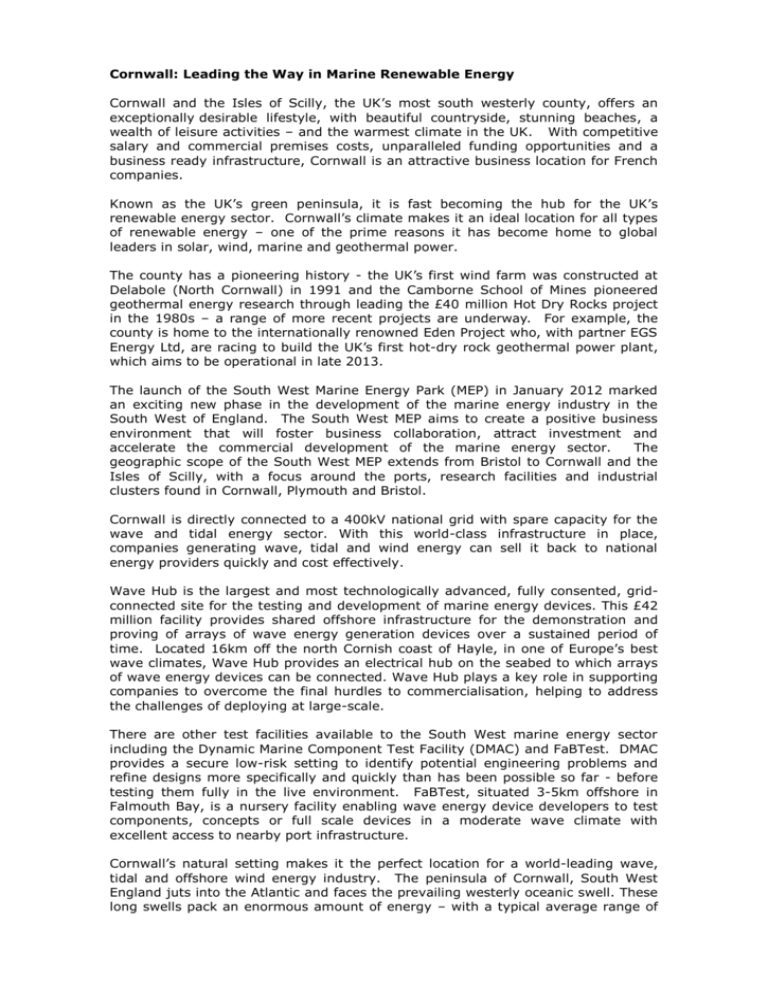Cornwall is home to the UK`s first commercial on-shore wind
advertisement

Cornwall: Leading the Way in Marine Renewable Energy Cornwall and the Isles of Scilly, the UK’s most south westerly county, offers an exceptionally desirable lifestyle, with beautiful countryside, stunning beaches, a wealth of leisure activities – and the warmest climate in the UK. With competitive salary and commercial premises costs, unparalleled funding opportunities and a business ready infrastructure, Cornwall is an attractive business location for French companies. Known as the UK’s green peninsula, it is fast becoming the hub for the UK’s renewable energy sector. Cornwall’s climate makes it an ideal location for all types of renewable energy – one of the prime reasons it has become home to global leaders in solar, wind, marine and geothermal power. The county has a pioneering history - the UK’s first wind farm was constructed at Delabole (North Cornwall) in 1991 and the Camborne School of Mines pioneered geothermal energy research through leading the £40 million Hot Dry Rocks project in the 1980s – a range of more recent projects are underway. For example, the county is home to the internationally renowned Eden Project who, with partner EGS Energy Ltd, are racing to build the UK’s first hot-dry rock geothermal power plant, which aims to be operational in late 2013. The launch of the South West Marine Energy Park (MEP) in January 2012 marked an exciting new phase in the development of the marine energy industry in the South West of England. The South West MEP aims to create a positive business environment that will foster business collaboration, attract investment and accelerate the commercial development of the marine energy sector. The geographic scope of the South West MEP extends from Bristol to Cornwall and the Isles of Scilly, with a focus around the ports, research facilities and industrial clusters found in Cornwall, Plymouth and Bristol. Cornwall is directly connected to a 400kV national grid with spare capacity for the wave and tidal energy sector. With this world-class infrastructure in place, companies generating wave, tidal and wind energy can sell it back to national energy providers quickly and cost effectively. Wave Hub is the largest and most technologically advanced, fully consented, gridconnected site for the testing and development of marine energy devices. This £42 million facility provides shared offshore infrastructure for the demonstration and proving of arrays of wave energy generation devices over a sustained period of time. Located 16km off the north Cornish coast of Hayle, in one of Europe’s best wave climates, Wave Hub provides an electrical hub on the seabed to which arrays of wave energy devices can be connected. Wave Hub plays a key role in supporting companies to overcome the final hurdles to commercialisation, helping to address the challenges of deploying at large-scale. There are other test facilities available to the South West marine energy sector including the Dynamic Marine Component Test Facility (DMAC) and FaBTest. DMAC provides a secure low-risk setting to identify potential engineering problems and refine designs more specifically and quickly than has been possible so far - before testing them fully in the live environment. FaBTest, situated 3-5km offshore in Falmouth Bay, is a nursery facility enabling wave energy device developers to test components, concepts or full scale devices in a moderate wave climate with excellent access to nearby port infrastructure. Cornwall’s natural setting makes it the perfect location for a world-leading wave, tidal and offshore wind energy industry. The peninsula of Cornwall, South West England juts into the Atlantic and faces the prevailing westerly oceanic swell. These long swells pack an enormous amount of energy – with a typical average range of 15-25 kw/m (kilowatts per metre of wave face) in the area around Wave Hub off the north Cornish coast, increasing to 35-40 kw/m in the area around the Isles of Scilly. While the waves are powerful, South West England benefits from less extreme storm conditions that would challenge the “survivability” of the devices. This is especially important in the early stages of their development. Looking further ahead, there is significant potential for the expansion of offshore wind in the South West. The development of floating wind technology could provide a cost effective alternative to fixed foundations and would allow the deployment of wind turbines in the deeper waters to the west of the Bristol Channel and off the Lizard Peninsula. Wave Hub has been confirmed by the UK’s Energy Technologies Institute (ETI) as the preferred location for its offshore wind floating platform system demonstrator. The project aims to develop, build and test a floating offshore wind turbine to investigate whether floating wind farms could play a costeffective role in helping to meet the UK’s energy needs. Wave Hub could host the project as early as 2015. The proposed Marine Renewables Business Park (MRBP) on North Quay, Hayle, is currently awaiting funding approval. The park will include 2591 sq m of secure, managed workspace. With the Wave Hub test site just 16km off the coast of Hayle, the Marine Renewables Business Park will be suitable for all businesses involved in the development, deployment and maintenance of wave power devices plus supply chains supporting this sector. Cornwall can offer marine renewable energy companies a rich skill set. Cornwall has been world renowned for marine engineering and associated industries. Traditional industries such as boat building and repair continue to thrive in Cornish ports, while the engineering skills that underpin them have been harnessed to support new industries such as marine pipeline installation and wind farm construction. Also, Camborne School of Mines is a source of new skills. It offers the UK’s first undergraduate programme in Renewable Energy (accredited by the Energy Institute) and is also one of the world’s foremost centres of research and teaching into the interface between earth science and sustainable development from an industry perspective. In addition, Cornwall is well connected to the rest of the UK; benefitting from excellent air, road and rail links. Business competitiveness and opportunities for flexible working are being transformed with the roll out of next generation broadband. The £132 million programme bringing superfast broadband to Cornwall allows internet speeds of up to 100Mbps, making Cornwall one of the best connected regions in Europe. Cornwall also has access to an unparalleled range of R&D support and to significant EU funding opportunities. For more information or to find out how Invest in Cornwall can help your business call +441872 322800, email info@investincornwall.co.uk or visit www.investincornwall.com. Invest in Cornwall is a project of Cornwall Development Company Key Facts about Cornwall: Area (in hectares) 354,628 Population: 532,300 Number of VAT and or PAYE (pay as you earn) registered businesses: 20,105 GDP per capita: 17,600 GVA per head: £7.3bn Structure of local government Single council called Cornwall Council Universities/Colleges: Businesses located in Cornwall have access to some of the UK’s finest graduates. Cornwall is one of the UK’s fastest growing study destinations, thanks to a massive expansion of university level education in the county through the Combined Universities in Cornwall (CUC) initiative. CUC brings together six universities and colleges in a unique partnership, working collaboratively to create new opportunities in Cornwall. Each university and college offers services to businesses, ranging from high level skills training through use of equipment and facilities to potential R&D collaborations and consultancy. There is also a central business support function which can make links between businesses and university and college partners. The CUC partners are: - University of Exeter - University of Plymouth - Falmouth University - Peninsula College of Medicine and Dentistry - Cornwall College - Truro & Penwith College. Below is an outline of a selection of CUC partners who offer a vast range of courses in Cornwall: The University of Exeter - A top 10 UK University with strengths in geography, biology, politics, law, mining and renewable energy. Camborne School of Mines is part of the University of Exeter and is a world-class centre of scientific and engineering excellence that actively fosters entrepreneurship, innovation and research. The school has expertise in geology, mining, minerals processing and renewable energy and applies this to world leading research and teaching. The University of Plymouth – Consistently ranked as one of the top three modern universities in the UK, the Enterprise University, has strengths in advanced composites manufacturing, entrepreneurship, environmental technologies and marine science, engineering and technology. Cornwall College - One of the largest further education (FE) colleges in the country and partners with a number of FE colleges. The main areas of research excellence are: - Digital economy Low carbon economy Creative industries Food & drink Sustainable construction Innovation and continuous improvement Engineering Marine Connections to London: Daily flights from Newquay Cornwall Airport to London Gatwick with a 1 hour flight time. Regular trains to London Paddington from Truro from as little as 4 hours 40 minutes. Biography of Author Dominique Tregenza-Symons is the UK & EU manager of Invest in Cornwall, Cornwall’s inward investment service. Invest in Cornwall has been set up to provide support to businesses interested in relocating to the county. Funded by Cornwall Council and a service of Cornwall Development Company, Invest in Cornwall helps companies looking to relocate to the county to source locations and business premises; grants and loans; secure IT, telecoms and broadband and provides advice on recruitment, training and education. Additionally, Invest in Cornwall is able to facilitate meetings with key personnel in local and regional institutions who can provide businesses with valuable input and further support. Dominique has worked at Invest in Cornwall since 2009. Prior to this, she managed a market research service, working primarily with start up and established small and medium sized businesses.






